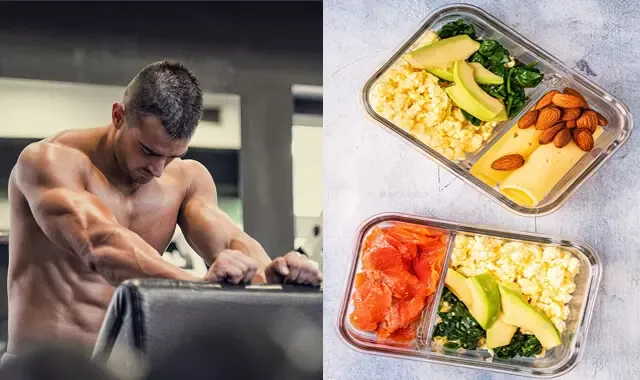The road to lose weight, lose weight, dry out is paved with good intention. In this battle, one of the common mistakes could be your failure.
Have you written down every calorie, refusing to eat what you love most, but see no results? If you've been on a diet and meal plan to the letter, but haven't seen a big change, it's time to take a closer look at your approach.
Sometimes small issues that pop up along the way can cause big problems if you don't deal with them right away. Do any of the following issues apply to you?
If so, fix them so that you can finally see the physical results you are looking for.
7 Reasons You Aren't Losing Weight
You've been on a diet for too long
When was the last time you left the dining table completely satisfied with your meal? If you still have that feeling of hunger eating at you, something needs to change!
The number one reason you're not burning fat the way you hoped could be that you've been dieting for too long. Prolonged dieting can put you in a calorie-reduced state. This hunger slows down your metabolism. Of course, you are consuming fewer calories, but you are burning less, which means you are not making progress.
If this sounds like you, take a break. Seriously! Don't be afraid to take a 2-4 week break and stop worrying about calories for calories. You just take a step back so that you can continue to see long term results.
Your measurements are not good
Perhaps the most common reason people don't lose weight is because they don't weigh their food properly.
You prepare your snack before bed. You put your spoon in the pot of peanut butter and generously drop a nice spoonful of Greek yogurt. But wait a minute… How much peanut butter was in that spoon?
If you estimated it was about a tablespoon, but it's closer to two, you've just added 80 to 100 calories to your diet. And you wonder why your diet is not working!
Peanut butter is a good example, as it's dense in calories and you usually don't take out the measuring spoon to do this. Making the same mistake with other high calorie foods like steak, salmon, pasta or nuts is why you don't lose weight and even why you put on pounds.
You abandon your plan on weekends
How many times have you heard someone say they stick to their diet… during the week? Arrived on weekends, these same rigorous diets fall into oblivion and these famous weekends even represent 30% of your total calorie intake.
If you only follow your diet 70% of the time, it’s no wonder you don’t see the weight loss you expect.
As for percentages, try the 90/10 rule instead: follow your diet 90% of the time, then relax and have fun for the remaining 10%. This is a great rule to follow. This allows you to indulge yourself, but while also helping you stay on the right track.
You don't see people following a 70/30 rule because spending 30% of the time ignoring the diet and having fun is never going to work. Be realistic with yourself about how you are following your eating plan. It is not enough to follow it to the letter, thinking of the week without considering the weekends. Weekends matter too.
You do not change your program as you go
People also don't see results because they don't adjust their program as they progress. They start their diet, see great results, and continue to do what they did in the beginning, expecting more results. Unfortunately, it doesn't always work like this.
Your body changes based on your plan, so your plan must change as well.
The thinner you are, the more your body will try to save fuel and go into “hungry” mode. As counter intuitive as it may sound, consuming more carbohydrates can help you avoid this reaction. Increasing your carbohydrate intake may also optimize your insulin sensitivity and the release of the hormone leptin, which helps maintain your body weight.
You exercise to burn calories
To lose weight, you have to train hard, right? There is nothing wrong with going to the gym for the sole purpose of burning calories, unless you are too obsessed with that one metric.
If you just want to burn calories, you're much more likely to jump on cardio machines all the time, simply because those machines display calories burned, making it easier to track your progress.
Strength training does not display calorie counts, although strength training can produce more significant physical changes!
This is why at least 70% of your training should be used for lifting weights. Cardio exercises are great, but they should be the icing on the cake, something to further improve your results through weight training, fitness.
Don't rely on cardio to put you in a calorie deficit.
For best results, do a series of strength training exercises, resting as little as possible between each.
A scientific study published in the “Journal of Strength and Conditioning Research” found that low rest training increases your post-workout calorie burn more than conventional training.
Your workouts are wearing you out
When you work out at the gym, you might think that doing it with your foot to the floor is a good thing. Working hard in the gym isn't bad on its own, but watch how that peak power influences the other 23 hours of your day.
Too many people, especially beginners, will work as hard as possible during their workouts, only to fall back into a very sedentary lifestyle the rest of the time. Why ? Because they are exhausted from training!
All the little bits of activity you do during the day can play a role in increasing your total daily calorie expenditure. If you are too tired to go for a walk, to clean, or to play with the children. Your workout may decrease, rather than increasing the number of calories you burn each day.
For example, let's say you do a tough, but not strenuous workout that burns 300 calories. This should leave you with enough energy to burn maybe an extra 400 calories for the rest of the day. Your total calorie burn will be 700.
Now, let's say you are doing an exhausting workout that burns 500 calories. It's so exhausting in fact that you spend the rest of the day on the couch. How many extra calories are burned? 50. So your grand total for the day is only 550 calories.
Bottom Line: If you train so hard that you can't do so much afterwards, you may reduce your ability to lose weight.
The juice bar is your favorite place after training
Finally, beware of this common post-workout mistake: indulging yourself by having a big snack after a big workout.
Whether or not you have a post-workout snack, you will retain all of the strength and cardiovascular improvements you gained during that workout. But, if you follow it up with a big smoothie or a cheese and cream bagel, you can end up with a neutral calorie count after all the effort you put in.
You need those post-workout carbohydrates. Just remember, those calories matter. You absolutely need to refuel post-workout, but don't consume 400 calories in the process.










0 Comments